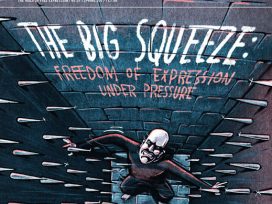Modernist humanism, in which individual rights and freedoms are won at the expense of the natural world, is entering into ever greater tension with the new emphasis on interconnectedness. Environmental historian Sverker Sörlin on the ongoing scientific renegotiation of concepts of humanity and nature.
Articles
Read more than 6000 articles in 35 languages from over 90 cultural journals and associates.
The sustainability of democracy
On limits to growth, the post-democratic turn and reactionary democrats
Emancipation, the central demand of democracy, has come to mean liberation from restrictive social and ecological imperatives. Before proposing radical participatory solutions we need to ask how democracy itself serves the politics of unsustainability, argues Ingolfur Blühdorn.
The death throes of Franco
Spain's new reckoning with the dictatorship and Civil War
Spain’s Amnesty Act of 1977 ensured that, during the first two decades of democracy, the memory of the Civil War and the human rights violations of the Franco dictatorship remained taboo. Initiatives by the Zapatero government to redress historic injustices signal a new era, yet there is a way to go before Spanish society is unanimous about its past, writes historian Julián Casanova.
Presente!
Western martyrdom and the politics of memory and death
What is the connection between the mediaeval hunt for relics and the idolization of Benno Ohnesorg? Or between Nietzsche and Oliver Cromwell? Outlining aspects of the history of western martyrdom and its ideologies, Michael Azar shows how to this day the dead are instrumentalized for the purposes of the living.
Genocides?
An interview with historian Ugur Ümit Üngör
The comparison of genocides is neither a crude equation nor an equivalence of evil, argues historian Ugur Ümit Üngör. Rather, comparative study enhances understanding of individual cases and counters political manipulation of genocide under hierarchies of uniqueness.

Cooperation between the communications industry and governments creates unprecedented opportunities for surveillance. Lets not repeat the mistakes of the past and allow companies to assume that users are uninterested in what happens to their data, urge Gus Hosein and Eric King of Privacy International.

In search of Europe
An interview with Jacques Delors
‘We don’t just need firefighters; we need architects too.’ Interviewed in 2010 by Mittelweg 36, Jacques Delors (1925–2023), three times President of the European Commission, spoke of ‘this Europe of values’, its triumphs and failures, and his hope that a federal Europe of nation states would eventually become a reality.
Relax!
Producing culture in a weak intellectual property environment
Cultural producers should be relaxed about digital technology’s erosion of copyright, writes Felix Stalder. A weak copyright regime offers a chance to re-embed cultural production in concrete, personal relationships out of which new economic models can and do emerge.
The good news for big print media is that demand for quality journalism has never been so high. Yet they need to move with the new technology to continue doing what they do best, writes Knut Olav Åmås, culture editor of the Norwegian daily ‘Aftenposten’.
Despite renewed crackdowns on the independent media in Belarus, there are signs that the tide is turning in the battle for free speech in the country. However, victory for the democratic forces will require politicizing Belarus’ young Internet audience, writes Iryna Vidanava.
Neurological and Darwinistic strands in the philosophy of consciousness see human beings as no more than our evolved brains. Avoiding naturalistic explanations of human beings’ fundamental difference from other animals requires openness to more expansive approaches, argues Raymond Tallis.
Why do we so uncritically buy the “democratic rhetoric” of our rulers instead of countering their selfish designs? How was it possible in too many post-communist countries that incredible riches accumulated in the hands of the parasitic few? Why is political power so often fused with wealth? These are only a few of the questions debated by two philosophers in search of an answer to what went wrong in the post-communist world after 1989.
Why is the Orthodox Church of Russia reclaiming the castles and churches of former East Prussia, now the Russian enclave of Kaliningrad, appropriated in 1917? The question is posed by a Lithuanian “outsider” in the light of recent changes in the ownership of important heritage sites in Kaliningrad.
What is the threat implied in the handover of the symbolically significant heritage of the Kaliningrad region to the Orthodox Church of Russia? An examination of the social and cultural aspects of the conflict.
The politics of no alternatives or How power works in Russia
An interview with Gleb Pavlovsky
Gleb Pavlovsky, the Ukrainian-born former dissident turned “political technologist”, abruptly fell out with the Kremlin in April, reportedly over “indiscreet comments” made about the 2012 presidential elections. In interview with Transit a short while before, Pavlovsky gave a revealing inside view of the workings of political power in the former Soviet Union and in post-Soviet Russia.
History has a long fuse and memory often betrays the past. A journey across borders and through no man’s lands brings that past alive and reminds us of what we have lost, in particular the diversity of the past and the beauty of the “other”.